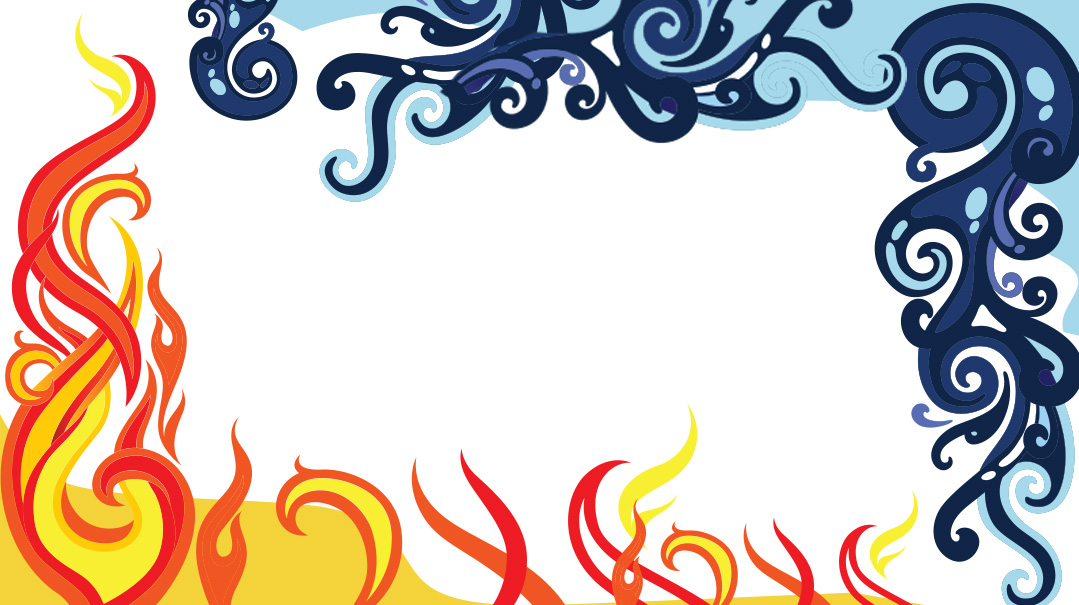Like Fire and Water
| June 20, 2023Try this for a more positive spin: Saying no to something means you’re saying yes to something else

Like Fire and Water
Dina Schoonmaker
There’s a model for understanding personalities based on the four elements of Creation: Fire, water, earth, and air. Every one of these four represents a certain personality type that can be used for good or for bad.
Fire goes upward, and burns whatever is in its path, and correspondingly, people with the eish personality are very passionate, motivated, growth-oriented, sometimes perfectionistic. They always want to do better and better.
People using the koach of fire at its highest level burn problems; they’re the ones who start organizations to fight poverty, to fight child abuse, and otherwise improve the community.
On its lowest level, the eish personality burns other people with criticism and judgment.
In its average presentation, people with the eish personality turn this force inward. They leverage this destructive force to try to become a better version of themselves, burning out the old behaviors they no longer deem satisfactory.
A woman with this personality always wants to daven better; she’ll attend parenting classes to become a better mother and exercise classes to get in shape. This person is always motivated by the next step; she wants to improve herself, her family, the world.
Many Jewish women have eish personalities, and accomplish so much using this koach.
The danger it presents is that a woman like this can be overly critical of herself or others, or experience instability due to constant unhappiness with the level she’s at as she strives for something higher. The challenge of the eish personality is to be able to find the joy in an imperfect situation even while still attempting to grow.
THE WATER PERSONALITY, mayim, represents pleasure and life. The main drive of the water personality is to connect, to find pleasure in what they’re doing.
At its higher level, it presents as a healthy enthusiasm for Yiddishkeit, family, and life. The mayim person loves his minyan, loves his exercise class, and deeply enjoys what he does.
Mayim personalities must have a profession they enjoy, even if it isn’t so lucrative financially, because they can’t go to the office and work for something they don’t love and connect to.
While the eish-personality mother has goals for her children and is always trying to improve them, the mayim-personality mother loves to spend time with her children, connecting and appreciating each child where he or she is at. The challenge of the mayim personality is when they need to do things they don’t enjoy. They also sometimes struggle with too much pursuit of pleasure, which can also lead to addictions.
Dina Schoonmaker has been teaching in Michlalah Jerusalem College for over 30 years. She gives women’s vaadim and lectures internationally on topics of personal development.
No Is the New Yes
Shoshana Schwartz
You’ve heard that saying yes to something means you’re saying no to something else. Since resources available to humans are finite, we need to make choices to eliminate options. Whether it’s choosing how to best allocate 300 minutes, 300 dollars, or 300 words for A Better You, we just can’t have it all.
Our communal commitment to chesed can sometimes mislead us into thinking we need to say yes to every opportunity to help that comes our way. Remembering that every yes means a no to something else reminds us that we need to prioritize which people, situations, and things receive our limited resources.
But saying no can sound so… negative. Try this for a more positive spin: Saying no to something means you’re saying yes to something else.
Saying no to that pair of $200 shoes your daughter wants is saying yes to two cheaper pairs, or a few hours of tutoring for that same daughter.
Saying no to driving your 15-year-old son to his friend (who lives a ten-minute walk away) means saying yes to making your husband a smoothie before Minchah.
Saying no to that brownie is saying yes to your commitment to eat healthfully.
While saying no can be difficult, it also invites you to explore what other options are more suitable for you at this time.
Expand your horizons to include new possibilities as you work on identifying priorities, accepting limits, overcoming fears, and broadening your thinking. And remember that no is the new yes.
Shoshana Schwartz specializes in addiction and codependency. She gives in-person and online addiction prevention lectures and workshops to education and mental health professionals, community leaders, and parent groups, as well as 12-Step workshops for non-addicts.
Fight, Flight, Freeze... or Fawn
Abby Delouya
Fawning is a trauma response where a person develops people-pleasing behaviors in an effort to avoid conflict and establish a sense of security and safety.
What does it look like? Trouble identifying feelings, rushing to cater to others’ demands, appeasing an angry person in conflict regardless of one’s actual stance, and trouble setting healthy emotional boundaries in a relationship are all behaviors that may indicate fawning.
Fawning is more commonly associated with complex post-traumatic stress disorder rather than a singular traumatic incident, and involves a relationship component. Young children and adolescents displaying fawning behaviors may experience intense worry about their parents or feel preoccupied with their parents’ emotional needs. They may also be overly cautious during personal interactions with people in positions of authority. As people grow up, this response can be transferred to a spouse.
If not addressed and healed in the context of trauma work, fawning can turn into serious codependent behaviors and relationships.
Abby Delouya, RMFT-CCC, CPTT is a licensed marriage and individual therapist with a specialty in trauma and addiction.
(Originally featured in Family First, Issue 848)
Oops! We could not locate your form.







